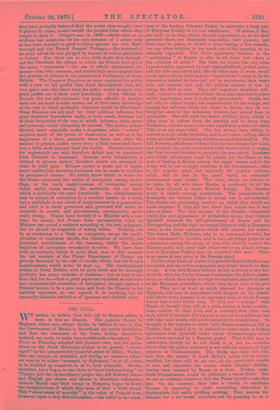THE " GOLOS " ON LORD BEACONSFIELD.
THE absurd article in the Golos accusing Lord Beaconsfield of pecuniary corruption, translated by the Berlin Correspon- dent of the Times, and published in that journal on Tuesday, deserves a little more attention than Englishmen are usually disposed to accord to such malignant nonsense. Its publication in St. Petersburg, followed by the official " regret" of the Russian Government that it should have been published, reveals more clearly than any incident of late years the depth of the suspiciousness which has invaded Continental society, and which threatens in many cases to impair most seriously the freedom of statesmen's action. Even if Lord Beaconsfield were not, as his career proves him to be, a man with every ambition except that of making money, he is an English Minister, and English- men no more think of accusing a Minister of making money by the use of official information than of accusing him of murder. Lord Beaconsfield might be in error in buying the Suez-Canal shares, or might be perverse, or might even have violated the Constitution, by contracting for such a purchase without previous Parliamentary sanction, but that he bought the shares in order that a confederate might pocket profits out of the shares, to be afterwards divided with the Minister, is an idea that, we venture to say, never entered any Englishman's head. The wildest partisan
in a pot-house would be laughed at if he ventured on such an accusation. He would not be laughed at in France if he made the same accusation against a much richer AtinintPr. The Due Decazes said openly from his place in the Tribune that it would have been impossible for him or any other Minister in France to make such a coup as the purchase of the Canal Shares, because he would have been suspected by his opponents of making it for his own pecuniary advantage, and his audience laughed an assent. So deeply rooted in Paris is this form of distrust, that it exercises a definite political influence, and sometimes cripples the boldest plans of otherwise resolute men. No assertion of the kind is too wild to receive some credence. Thousands of Frenchmen believe implicitly that M. Gambetta, a man of narrow means and simple mode of living, shared in the profits of the contracts he gave during his Dictatorship ; and we have seen the broadest hints in newspapers that M. Thiers, who owed his fortune to a wealthy marriage, made it when Minister under Louis Philippe by unblushing " concus- sion." Parisians assert to this day that not only was the Mexican war commenced in order to obtain payment of the Jecker Bonds—bonds held by an influential clique—but that the Emperor, who by all evidence saved nothing and was utterly careless of money, himself participated in the plunder,—sold the army of France, in fact, in order to pacify his creditors. Character scarcely seems to be any defence against these accu- sations, which sometimes strike whole parties, till we venture to say that there is no Bonapartist alive—and there are some honourable Bonapartists—against whom a direct accusation of peculation would not, in Orleanist or Republican circles, receive some degree of attention. Berlin is more clear of this form of suspiciousness, perhaps from its long-continued certainty that the Hohenzollerns will not stand theft ; but in Vienna and Pesth the distrust is as deep as in Paris, and in St. Petersburg and Moscow deeper still. There are men in Vienna in re- putable positions who will tell you gravely that the defeats of the Austrian army were due to money dexterously employed, and a wild story of an Archbishop whom Bismarck bought and the Emperor ordered to be shot, was related in the writer's presence without an idea on the speaker's part that he was in the least drawing upon the credulity of his audience. In Pesth they will tell you stories of contracts which, if you believed them, would make you believe the high Austrian aristocracy—who, to do them justice, never think about money even when they ought—a gang of peculators ; and discontented Magyars will prove to you, if you have the patience, that every leader in Hungary except Deak has at some time or other been sold. Of the state of feeling in St. Petersburg and Moscow English- men may partially judge, from the credence which the con- ductors of the Golos thought their malignant romance would obtain, but even when they have read it they will not have gauged the credulity of Russian society in believing evil. Muscovites in a gossiping mood explain everything by crime, and no more believe that an official, however highly placed, can keep his hands clear of pelf, than an Englishman can believe a Jesuit honest or a Greek free from political guile. Political society is honeycombed with suspicion, till in every capital of Europe except Berlin great men are compelled to defend themselves either by a caution which makes them alike weak and sensitive, or by a cynical callousness which ends in the first cause of tyranny,—contempt for the judgment and the motives of ordinary mankind.
It is very difficult, perhaps impossible, for an Englishman to decide, even in his own mind, on the extent to which this suspiciousness, so universal, so degrading, and so debilitating, has any justification in fact ; but we believe it will be found that, as usual in all such cases, the distrust arises from a gross exaggeration of an unpleasant truth. We question if in any country of Europe direct and planned treachery for money such as that imputed to Lord Beaconsfield by the Golos has occurred during this century. Memoirs have been published of late years containing the most secret histories of great Courts. Quarrels a outrance among men who must have known everything have at once delighted and dismayed the public. Dozens of men who have benefited by corruption have been rained, have lost their self-control, and have not only revealed everything, but have invented a great deal more than ever occurred. Yet we cannot recall a single proved instance, or probable instance, since 1815 of the conscious betrayal of a country, an army, or a party for direct pecuniary gain. There is no trace of evidence that any man sufficiently highly placed in Europe to com- mand events has ever manipulated them to the disadvantage of his State for the purpose of making a colossal fortune. Men have ruined their countries to win power, but in all cases they have probably believed that the power they sought, even if gained by crime, would benefit the peoples from whom they sought to steal it. Giirgei's ease, in 1848—which rests on no evidence but suspicion—is the only instance of a crime such as has been charged on good evidence against our own Marl- borough and the French General Pichegru,—the betrayal of an army which he was pledged by honour as well as patriotism to defend. But there can be very little doubt that through- out the Continent the offence to which the French have given the name " concussion "—the use of official information for money—has been common, and excites little more disgust than the practice of bribery in the unreformed Parliament of Great Britain. The Emperor Napoleon no more regulated his policy with a view to his profits than Lord Beaconsfield does, but very great men who knew what his policy would be made very great profits out of their early knowledge. Great officials in Austria did not sell contracts, but great officials in Austria were not ashamed to make money out of their early knowledge of the way in which profitable contracts would be distributed. Great Russians are not paid for their political influence, but great Russians' dependants make, or have made, fortunes out of their knowledge of the way in which influence, often secret and personal, would ultimately be exerted. The public, always shrewd, more especially under a despotism, when " society " acquires much of the power of observation as well as of the suppleness of a slave, perceives these facts, and after the manner of gossips, makes every story a little worse and there- fore a little more piquant than the reality. Because contracts for regimentals are sold, therefore defeat may be purchased from Generals in command. Because early information is utilised to procure money, therefore events are arranged in order to yield gain. Because money is made out of states- men's vacillations, therefore statesmen can be made to vacillate by promises of money. We hardly know which is worse for the States concerned, the reality of corruption among under- lings, or the ready suspiciousness of corruption among chiefs which exists among the multitude, but we know which is politically the more formidable. An administration may be purged of corruption by a resolute master in a week, but a multitude is not cured of suspiciousness in a generation; and until it is cured governors and governed will never be cordially in accord, and governments, consequently, never really strong. France loses terribly if a Minister sells a con- tract for money, but France loses permanently when no Minister can award a contract according to his best judgment, lest he should be suspected of taking bribes. Nothing can be as weakening to a State as corruption, except the multi- plication of cumbrous checks, the limitation' of activity, the perpetual watchfulness of the innocent, which the unjust suspicion of corruption necessarily involves. We have been told, on authority which is quite final, that at this moment the net receipts of the Fnielst Departfneet of France are gravely decreased by the &let of checks, which, but for French suspiciousness, would never be kept tip. The constitutional system of Great Britain, with its party strife and its thorough publicity, has many elements of weakness ; bet at least it has done this for us,—that a great paper can republish an elaborate and circumstantial accusation of corruption, brought against a Premier known to be a poor man, and from the Premier to his smallest opponent, no one regards it at anything but an unusually imbecile exhibition of ignorant and childish spite.



































 Previous page
Previous page